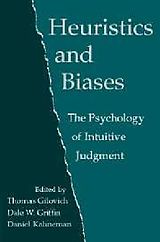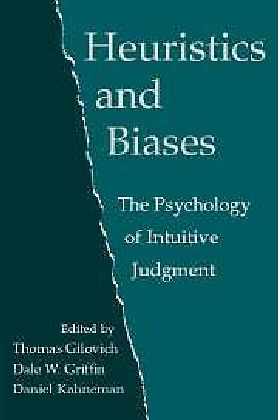Heuristics and Biases
Einband:
Kartonierter Einband
EAN:
9780521796798
Untertitel:
The Psychology of Intuitive Judgment
Herausgeber:
Cambridge University Press
Anzahl Seiten:
882
Erscheinungsdatum:
10.09.2013
ISBN:
0521796792
This book, first published in 2002, compiles psychologists' best attempts to answer important questions about intuitive judgment.
Klappentext This book compiles psychologists' best attempts to answer important questions about intuitive judgment. Zusammenfassung Judgment pervades human experience. When do people make judgments that serve them well! and why are they accurate in these situations? When are people's judgments prone to bias! and what is responsible for their biases? This book! first published in 2002! compiles psychologists' best attempts to answer these important questions. Inhaltsverzeichnis Introduction: heuristics and biases then and now; Part I. Theoretical and Empirical Extensions: 1. Extensional versus intuitive reasoning: the conjunction fallacy in probability judgment; 2. Representativeness revisited: attribute substitution in intuitive judgment; 3. How alike is it versus how likely it is: a disjunction fallacy in probability judgments; 4. Imagining can heighten or lower the perceived likelihood of contracting a disease: the mediating effect of ease of imagery; 5. The availability heuristic revisited: ease of recall and content of recall as distinct sources of information; 6. Incorporating the irrelevant: anchors in judgments of belief and value; 7. Putting adjustment back in the anchoring and adjustment heuristic: differential processing of self-generate and experimenter-provided anchors; 8. Self anchoring in conversation: why language users don't do what they 'should'; 9. Inferential correction; 10. Mental contamination and the debiasing problem; 11. Sympathetic magical thinking: the contagion and similarity 'heuristics'; 12. Compatibility effects in judgment and choice; 13. The weighing of evidence and the determinants of confidence; 14. Inside the planning fallacy: the causes and consequences of optimistic time predictions; 15. Probability judgment across cultures; 16. Durability bias in affective forecasting; 17. Resistance of personal risk perceptions to debiasing interventions; 18. Ambiguity and self-evaluation: the role of idiosyncratic trait definitions in self-serving assessments of ability; 19. When predictions fail: the dilemma of unrealistic optimism; 20. Norm theory: comparing reality to its alternatives; 21. Counterfactual thought, regret, and superstition: how to avoid kicking yourself; Part II. New Theoretical Directions: 22. Two systems of reasoning; 23. The affect heuristic; 24. Individual differences in reasoning: implications for the rationality debate?; 25. Support theory: a nonextensional representation of subjective probability; 26. Unpacking, repacking, and anchoring: advances in support theory; 27. Remarks on support theory: recent advances and future directions; 28. The use of statistical heuristics in everyday inductive reasoning; 29. Feelings as information: moods influence judgments and processing strategies; 30. Automated choice heuristics; 31. How good are fast and frugal heuristics?; 32. Intuitive politicians, theologians, and prosecutors: exploring the empirical implications of deviant functionalist metaphors; Part III. Real World Applications: 33. The hot hand in basketball: on the misperception of random sequences; 34. Like goes with like: the role of representativeness in erroneous and pseudoscientific beliefs; 35. When less is more: counterfactual thinking and satisfaction among Olympic medalists; 36. Understanding misunderstanding: social psychological perspectives; 37. Assessing uncertainty in physical constants; 38. Do analysts overreact?; 39. The calibration of expert judgment: Heuristics and biases beyond the laboratory; 40. Clinical versus actuarial judgment; 41. Heuristics and biases in application; 42. Theory driven reasoning about plausible pasts and probable futures in world politics....
Autorentext
Daniel Kahneman, geboren 1934 in Tel-Aviv, ist einer der weltweit einflussreichsten Kognitionspsychologen. Nach Stationen an der Hebrew University in Jerusalem und der University of British Columbia war er bis 1994 Professor an der University of California in Berkeley und hält seither die Eugene-Higgins-Professur für Psychologie an der Woodrow Wilson School der Princeton University. Kahnemann revolutionierte die Wissenschaft vom menschlichen Verhalten, indem er die Erkenntnisse der Hirnforschung und der Verhaltensbiologie zusammenführt und auf die Wirtschaftswissenschaften anwendet. Für seine Arbeit erhielt Kahneman zahlreiche Ehrenpreise namhafter Universitäten und wurde 2002 als erster Nicht-Ökonom mit dem Wirtschaftsnobelpreis ausgezeichnet.
Zusammenfassung
Judgment pervades human experience. When do people make judgments that serve them well, and why are they accurate in these situations? When are people's judgments prone to bias, and what is responsible for their biases? This book, first published in 2002, compiles psychologists' best attempts to answer these important questions.
Inhalt
Introduction: heuristics and biases then and now; Part I. Theoretical and Empirical Extensions: 1. Extensional versus intuitive reasoning: the conjunction fallacy in probability judgment; 2. Representativeness revisited: attribute substitution in intuitive judgment; 3. How alike is it versus how likely it is: a disjunction fallacy in probability judgments; 4. Imagining can heighten or lower the perceived likelihood of contracting a disease: the mediating effect of ease of imagery; 5. The availability heuristic revisited: ease of recall and content of recall as distinct sources of information; 6. Incorporating the irrelevant: anchors in judgments of belief and value; 7. Putting adjustment back in the anchoring and adjustment heuristic: differential processing of self-generate and experimenter-provided anchors; 8. Self anchoring in conversation: why language users don't do what they 'should'; 9. Inferential correction; 10. Mental contamination and the debiasing problem; 11. Sympathetic magical thinking: the contagion and similarity 'heuristics'; 12. Compatibility effects in judgment and choice; 13. The weighing of evidence and the determinants of confidence; 14. Inside the planning fallacy: the causes and consequences of optimistic time predictions; 15. Probability judgment across cultures; 16. Durability bias in affective forecasting; 17. Resistance of personal risk perceptions to debiasing interventions; 18. Ambiguity and self-evaluation: the role of idiosyncratic trait definitions in self-serving assessments of ability; 19. When predictions fail: the dilemma of unrealistic optimism; 20. Norm theory: comparing reality to its alternatives; 21. Counterfactual thought, regret, and superstition: how to avoid kicking yourself; Part II. New Theoretical Directions: 22. Two systems of reasoning; 23. The affect heuristic; 24. Individual differences in reasoning: implications for the rationality debate?; 25. Support theory: a nonextensional representation of subjective probability; 26. Unpacking, repacking, and anchoring: advances in support theory; 27. Remarks on support theory: recent advances and future directions; 28. The use of statistical heuristics in everyday inductive reasoning; 29. Feelings as information: moods influence judgments and processing strategies; 30. Automated choice heuristics; 31. How good are fast and frugal heuristics?; 32. Intuitive politicians, theologians, and prosecutors: exploring the empirical implications of deviant functionalist metaphors; Part III. Real World Applications: 33. The hot hand in basketball: on the misperception of random sequences; 34. Like goes with like: the role of representativeness in erroneous and pseudoscientific beliefs; 35. When less is more: counterfactual thinking and satisfaction among Olympic medalists; 36. Understanding misunderstanding: social psychological perspectives; 37. Assessing uncertainty in physical constants; 38. Do analysts overreact?; 39. The calibration of …

Leider konnten wir für diesen Artikel keine Preise ermitteln ...
billigbuch.ch sucht jetzt für Sie die besten Angebote ...
Die aktuellen Verkaufspreise von 6 Onlineshops werden in Realtime abgefragt.
Sie können das gewünschte Produkt anschliessend direkt beim Anbieter Ihrer Wahl bestellen.
Loading...
Die aktuellen Verkaufspreise von 6 Onlineshops werden in Realtime abgefragt.
Sie können das gewünschte Produkt anschliessend direkt beim Anbieter Ihrer Wahl bestellen.
| # | Onlineshop | Preis CHF | Versand CHF | Total CHF | ||
|---|---|---|---|---|---|---|
| 1 | Seller | 0.00 | 0.00 | 0.00 |
